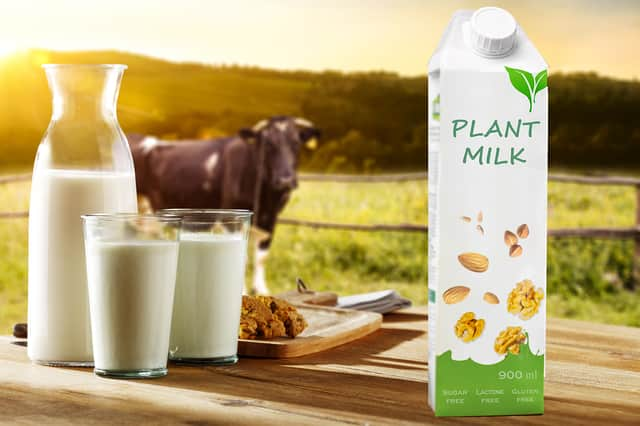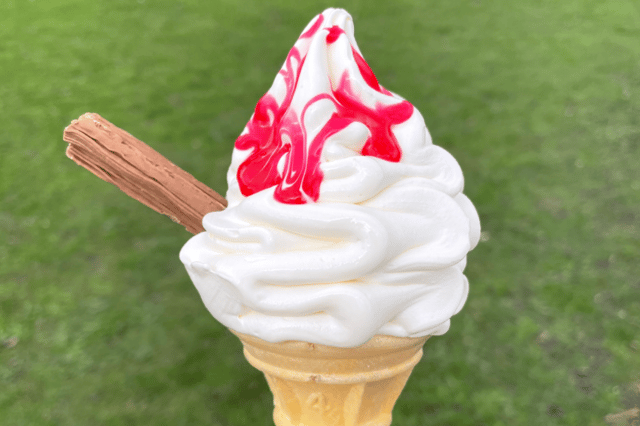This World Milk Day I want to praise plant-based milk - a much-needed sustainable alternative
and live on Freeview channel 276
I vividly remember my first ice cream. It was from a Mr Whippy van on a breezy summer day as the temperature drops in the late afternoon. What is exactly instilled into my mind is the ice cream itself, covered in a raspberry syrup - or red as I used to call it - with a single flake bobbing as it dripped from the cone onto my hand. It was just so light! That was my first love affair with dairy.
Being young, around six-ish, I hadn’t realised the commanding role the dairy industry played in the world. A few years prior in 2001, the Food and Agriculture Organisation of the United Nations established World Milk Day just to accentuate the importance of milk as a global food and to celebrate the dairy sector - which supports the livelihoods of one billion people, in other words, one-eighth of the global population.
Advertisement
Hide AdAdvertisement
Hide AdHowever, around 15 years later I was struck like lightning by something that affects 68% of the world - lactose intolerance - and it changed the way I interacted with milk forever. As World Milk Day arrives on 1 June, I’ve taken the time to reflect on my own fever dream of a journey with milk.
I’ve tried them all. Rice milk, oat milk, soya milk, hemp milk, almond milk, cashew milk, pea milk, the list is just endless. Growing up with milk as a staple in my diet, through tea, cereal, ice cream and even through the heartfelt remedy of boiled milk and honey, I was devastated when I realised my body could no longer handle it. It had been such a huge part of my life - and with desserts and many South Asian dishes having a heavy lactose base, I was determined to find an alternative.


Luckily for me, my personal circumstances collided with the boom in veganism, and soon enough alternative milk hit the store shelves, which already saved me time and money going through alternative healthcare shops. Soya milk was the first to be tried, but I found it left an odd aftertaste of something I couldn’t quite recognise. I soon began to leave cups of tea half-drunk, swapped out cereal for water-based porridge and avoided having milk whenever possible. One thing I didn’t want to give up was ice cream - but in my opinion, soya ice cream lacks the richness I was used to. It seemed like my love affair with milk was dwindling.
A friend recommended I try oat - but that was too heavy. For me, it didn’t sit right with the honey and wasn’t what I was used to in tea. Although barista oat milk came close - it was almost £2 for a litre, so I was hesitant to use it for milkshakes, big cereals and desserts. I never did like almonds so that milk was tried just on the off chance it worked in tea - it didn’t.
Advertisement
Hide AdAdvertisement
Hide AdHemp milk, pea milk and rice milk had to be sourced via alternative shops, which again, cost a lot more for a lot less. Although I did enjoy coconut milk (long live Bounty chocolate), the taste began to become sour after the third cup of tea in a day. This went on for months, with every empty carton of alternative milk being swapped out for the next one on my list but nothing comes close to being economically sustainable, and equally delicious.
Until one day, in an Uber, as I was spilling my milk woes (as you do), the driver recommended lactose-free milk - which was said in a “duh” kind of tone. I had never heard of it before, but it was cow's milk…just without the lactose. A revelation! A massive joy in a strange journey in which I felt alone. Where could I source it from? Well - anywhere. How had I missed this?
Years after the Earl was separated from its Grey, and crunchy nut cereals tasted sour, I finally found my substitute to pure cow's milk. Just without the lactose. Now I could begin to rekindle my affair and naturally bought a multi-box of cereal filled with children’s classics in celebration.
Yet I still find myself choosing barista oat milk when it is on sale. This journey made me consider the environmental impact of the dairy industry and the richness of the alternatives available - which is something I began to warm up to.


Advertisement
Hide AdAdvertisement
Hide AdTV solved my ice cream problem. As I fast-forwarded through the adverts, something caught my eye. A blue bottle took centre screen as I rewound to double take - Lactaids. Just a tiny flavourless tablet which helps you digest lactose and is readily available in healthcare shops. It never occurred to me there could be an aid - but as milk is such an integral part of our diets, of course, there is. Through months of research and dessert yearning, I now have a little system in place to peacefully coexist in a country so dependent on dairy - and sometimes that includes plant-based milk.
With people being more economically conscious, the decision to swap out milk for alternatives is increasing in popularity. Our relationship with milk is evolving - even on a recent trip to Barcelona, the hotel I stayed at offered leche sin lactosa (milk without lactose), and eco-friendly alternatives such as locally-sourced oat milk.
This World Milk Day is about how the dairy sector is reducing its environmental footprint so we can be actively conscious of what we are consuming - which is more important than ever as well as how farmers, workers and the animals in the industry are being treated.
Although I found lactose-free milk, and rely on it heavily, this is not an option available throughout the world. My journey has taught me how important plant-based alternatives are for people who cannot tolerate milk, and previous diet restrictions such as eating pizza or having ice cream have now opened back up for them because of this relatively recent introduction.
Advertisement
Hide AdAdvertisement
Hide AdWorld Plant Milk Day, however, does exist. It’s new and was created on 22 August 2017. But we should take time on World Milk Day to recognise how our relationship with cow milk is changing and adapting alongside plant-based milk. Milk isn’t just a dairy product anymore, it's a new way of sustainable eating.
Comment Guidelines
National World encourages reader discussion on our stories. User feedback, insights and back-and-forth exchanges add a rich layer of context to reporting. Please review our Community Guidelines before commenting.
